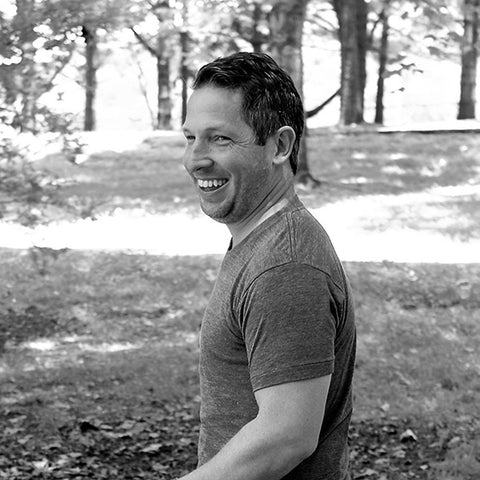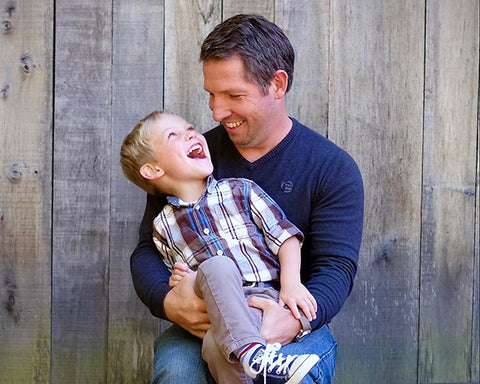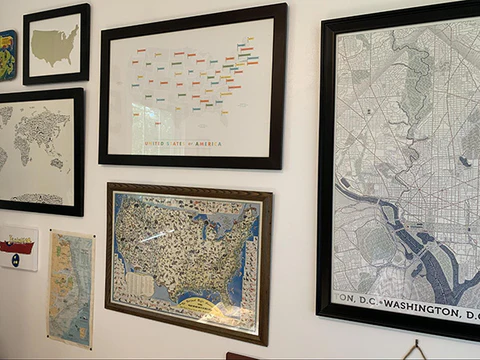Meet the Team: Jacob Fentress
Aug 02, 2019

Next up in our Meet the Team series is Jacob Fentress, ABA’s web developer. He tells us about the fiction he’s been loving lately, why exclamation points are key to remote work success, and a piece of advice that has stuck with him since high school.

ABA: What do you do at A Book Apart? What did you do before joining the team?
Jacob Fentress: I’m a web developer, which means I spend a lot of time in Shopify templates and CSS files to keep the website looking nice, and behaving (usually). Ultimately, I think my work is less about specific lines of code and more about finding ways to make the site more customer-friendly and easier to manage for our staff.
I work at A Book Apart part-time. When I first joined the team, I was running my own small web agency (I think that’s a fancy way of saying “freelance”) and I now work with the wonderful folks at Fictive Kin.
Prior to sixteen years (oh, man) in the web industry, I spent time in theatrical production—meaning lighting, sets, sound—and design. It’s easy to see now how my enjoyment of the problem-solving required in that world translated so well to working on the web.
ABA: Where do you live and what do you love about your home?
JF: I live outside Nashville, Tennessee, about five miles away from where I grew up. I love that we are close enough to the city to easily enjoy what it has to offer, but far enough away for the night sky to be dark, the lightning bugs to be abundant, and for the frogs to announce the arrival of spring. Having a couple of kids, it’s super helpful to be near family, too. The kids get the benefit of being raised in (and loved by) a community, and my wife and I get the benefit of having time to spend together and maintain identities separate from our children. You’d have a difficult time convincing me it isn’t the best life. I can’t imagine moving.

ABA: What’s the first thing you do every morning to start your day on the right foot?
JF: Ha! You don’t even know how wrong of a person I am to answer this question. See, the night time version of myself has grand plans for the morning, but the morning version of myself is far smarter, and a saboteur to boot. I can ruin any morning routine I dream up.
My most productive time is mid-afternoon, so my best days are about setting up that time to be productive. In the morning, I take care of emails, organize to do lists to clear out my overactive brain, and try to get through any meetings that need to happen. It doesn’t always look the same for me, but planning during that first thirty minutes to an hour is essential.
ABA: When you’re not working, how do you like to spend your time?
JF: Like a lot of folks I know who work on computers all day, my free time usually involves decidedly untechnical things: a bit of woodworking, various projects on the farm, working in the garden, playing (or coaching) a bit of soccer, hiking, camping, kayaking. I’m a wannabe architect and a fan of true craftsmen. Lately, I’ve become a pretty big nerd about solar power and renewable resources.
I find, even in my spare time, I want to build things—things that are well considered and aesthetically pleasing. That’s why you see find me building tables, planning tobacco barn remodels, and sketching gardens. The more I can do those things, especially with my family, the happier I am.
ABA: What book have you read and loved lately?
JF: I’m not sure I can narrow it down to one, but I’ll name a few that have been a lot of fun. Most recently was Age of Myth by Michael J. Sullivan, preceded by (in no particular order) The Murderbot Diaries (series) by Martha Wells, Forever and a Day by Anthony Horowitz, The Invisible Library (series) by Genevieve Cogman, The Song of Achilles by Madeline Miller, The Long Way to a Small Angry Planet by Becky Chambers, and Dark Matter by Blake Crouch. I’m a big fan of fiction in my non-work reading, and I’ve primarily been in a science fiction phase for the last couple of years. There are a lot of fun things there, but the genre can get a little too dystopian for my taste sometimes.
ABA: Is there a quote or saying that inspires you to be yourself or do your best work?
JF: I love quotes and sayings, but they tend to not stick with me for more than a couple of days. There is a blog post by Michael Lopp on Rands in Repose called Russian History that has resonated with and inspired me for a good chunk of my career, however. It focuses primarily on some oddly-named hires that are important for successful teams.
I don’t have a computer science background or a technical degree, and this article has helped me see that I not only belong but can be a highly valuable team member—not in spite of, but potentially because of my background. And that, I believe, is what leads to my best work. Through the years, I’ve lead teams and made hires, and this concept has also helped me see and communicate value to those history majors, artists, and event planners I’ve been lucky enough to work with.
ABA: How do you make working remotely work for you?
JF: Use more exclamation marks. Seriously! For years, I was pretty adamantly against exclamation marks in my writing. It seemed juvenile. I was better than that.
If anything, working remotely has taught me that you have to make a special effort to relate in a human way, and working well with other people depends on a level of empathy that only comes with recognizing each other’s humanity and good intentions. And, shockingly, the exclamation mark has become my best friend to reach that goal. “Thanks!” and “thanks” are worlds apart. “Have a good weekend!”, “great work!”, and “whew!” just feel a little more like myself, and being more myself (and working with people who are themselves) is the single thing that has made working remotely stick for me for so long.
ABA: What is your favorite thing about your workspace?
JF: Maps! Obviously.

ABA: What industry trend or technology are you excited about?
JF: I love the (very slow) trend back to self-published blogs and personal sites. As much as I want to talk about native lazy loading, responsive images, grid layout, flexible typography or any number of other things, the web’s future depends on the people owning the web—not Facebook or Medium—for their own weird purposes instead of being a number in an advertising budget.
That and container queries, of course.
ABA: What tool, object, or ritual could you not live without to get you through a week?
JF: I still can’t make it through a work week without my trusty RSS reader (currently Reeder 4 on iOS). It’s the primary way that I’m exposed to new technologies that I end up wanting to investigate further. It’s also the best way to wind down at the end of the day. I browse through some articles (all from lovely sources that I’ve curated), make a couple of brain connections that help me when I run into problems in the future, and read a little more in depth on things that interest me. It’s been a trusted tool for over a decade and I haven’t found a better replacement.
ABA: Is there a piece of professional or life advice you’ve gotten that has always stuck with you? What is it?
JF: Going waaay back, in high school I remember being especially overwhelmed once with papers, tests, and extra curricular activities all happening at the same time. A mentor simply told me to do the next thing, then do the thing after that, then do the thing after that. And you know what? It was so true and has stayed with me. It’s not that it keeps me from getting stressed or overwhelmed, but it reminds me that you can still only do one thing at a time, so do the next most important thing and keep moving.
Get to know more of the people who make A Book Apart go—check out the rest of our Meet the Team series!
